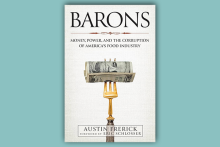monopoly

FARMER AND WRITER Wendell Berry has reminded us for decades that eating is an agricultural act, a daily, sacred practice that connects us to the land and people who produce our food. But given the story Austin Frerick tells in Barons: Money, Power, and the Corruption of America’s Food Industry, it’s fair to say eating is now an industrial act.
Frerick, an expert on agricultural and antitrust policy, grew up helping his grandparents farm near Cedar Rapids, Iowa. He watched dramatic changes in the state’s landscape over time: Corn and soybeans replaced diverse crops. Pigs and cows disappeared. Family farms and the local businesses that supported them faded away, replaced by industrial-scale farms.
Frerick looked for answers and found a handful of tycoons driving these changes across the U.S. He profiles seven of them, showing how their corporate monopolies have transformed every aspect of our food system.
Jeff and Deb Hansen are the hog barons. The Iowa couple has built an empire of hog confinement facilities, warehouses in which thousands of hogs are packed until ready for slaughter. It’s more profitable for meatpackers to buy these hogs than those from family farms, which has put thousands of small farmers out of business. Frerick writes that since the Hansens started their company in 1992, “the state’s pig population has increased by more than 50 percent while the number of hog farms has declined by over 80 percent.”

WHEN ELIZABETH MAGIE invented The Landlord’s Game, known today as Monopoly, she drew up two sets of rules: one “monopolist,” employing fierce competition and cutthroat property snatching, as the game is played today; the other “anti-monopolist,” namesake of a larger movement intended to demonstrate the dangers from unregulated wealth accumulation by the few and economic inequity in the late 1890s. Magie hoped that soon “men and women will discover that they are poor because Carnegie and Rockefeller, maybe, have more than they know what to do with.”
For Magie, daughter of an abolitionist and anti-monopolist, game creation was not simply an innocent pastime. She resonated with how games could provide a way to envision a new reality and usher in robust ideas.
When I was in college, several of my classmates in a world Indigenous literature class talked about how games we grew up playing—from Monopoly to Settlers of Catan—embodied settler colonialism and capitalism. In Settlers, the goal is to build as much as you can in unoccupied land and accumulate resources. In Monopoly, you aim to procure ownership of as many properties on the board as you can, raising rent to force other players into bankruptcy while you elude jail. Ticket to Ride-USA encourages players to build railroads across the United States, invoking the forces of manifest destiny without a critical lens. Jamaica is a board game where European pirates surround the island and battle for the most resources. Bang! The Dice Game catalogs life in the “Wild West,” where the French, Mexicans, and “Indians” fight each other; one dice roll can “save” a player from an “Indian attack.”
AS THIS IS written, the Federal Communications Commission is, again, preparing to rule on a revision of its media ownership rules that could, again, allow the few remaining mass media conglomerates to own even more of what are currently competing local news outlets. For one thing, the proposed revision would allow Rupert Murdoch's News Corporation to have its Los Angeles and Chicago TV stations and eat the L.A. Times and Chicago Tribune, too.
Five years ago, the Bush administration's FCC commissioners tried this move, but it was routed in a decision by a federal appeals court. But, just in time to quash any illusions that a second Obama administration might be less friendly to corporate power, Julius Genachowski, the Obama-appointed FCC chair, tried, at the end of 2012, to quietly slip in this new set of Murdoch-friendly ownership rules. The only reason it may not have happened already is because he raised the issue at the same time that an FCC report on minority media ownership arrived showing the share of outlets owned by people of color to be only 2.2 percent for commercial full-power television and 6.2 percent for commercial AM radio. This, needless to say, raises questions about the wisdom of further media consolidation.
Over the decades, this column has spilled a lot of ink on the subjects of the FCC, media policy, and, especially, media ownership. I haven't obsessed over these issues because of any love for the details of broadband allocation and other regulatory minutiae. In fact, I struggle to understand some of those matters just well enough to try and explain why they are important. But they are important, mostly because deregulated and monopolistic mass media impinge upon our ability to effectively exercise our God-given free will and participate rationally in the process of self-government.
